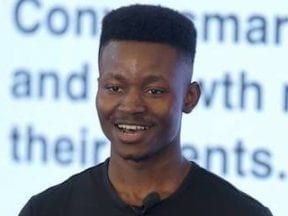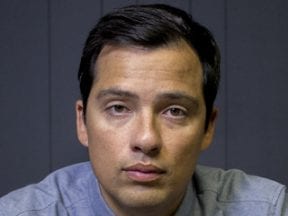In 2012 Vivian Kaye was a successful wedding decorator. But she had a problem. The climate in Toronto, Canada, was brutal on her hair.
“Black women used to put chemicals in their hair,” she told me. “But in the early 2010s, many of us were tired of that crap. However, our hair is not suited to the cold North American environment. It strips moisture, making it dry and brittle.”
Kaye’s solution was hair extensions, which were easy and attractive. Fast forward to 2021, and KinkyCurlyYaki, Kaye’s company, sells hair extensions, wigs, and more — all to empower Black women with confidence and beauty.
She and I recently spoke about the business, ecommerce, and her process for developing new products. Our entire audio conversation, below, is followed by a transcript that has been edited for length and clarity.
Eric Bandholz: Tell us about your company.
Vivian Kaye: KinkyCurlyYaki is a premium, textured-hair-extensions brand for Black women. I started the business in 2012 because I had a problem to solve. I was a wedding decorator at the time. I needed a style to protect my hair. Here in Toronto, a protective style is usually wigs, weaves, and braids.
Anytime you see Oprah or Serena Williams or even Beyoncé in public, they’re typically wearing a protective style, as do many Black women. It’s easier for us to manage day-to-day. Plus, there’s societal pressure on what women need to look like, especially Black women, which prompts women to wear their hair straight.
Black women used to put chemicals in their hair. But in the early 2010s, many of us were tired of that crap. So we stopped doing it. We started wearing our hair natural. However, our hair is not suited to the cold North American environment. It strips moisture, making it dry and brittle.
I started looking for textured hair extensions. But I couldn’t find something that looked like my hair instead of, say, 32 inches of blonde weave à la Nicki Minaj, the actress and singer.
So I filed the idea in the back of my head because, again, I was running a successful service-based business. It was not on the internet. Then I did my research — Facebook groups, forums.
So I found a solution to my problem. I started wearing it. I went to a networking event, and another Black woman pulled me aside and said, “Hey girl, who does your hair? Who’s your hairdresser? What’s your regimen to get your hair to look like that?” I just looked at her and said, like, “Girl, this is a weave.” She said, “I would buy that.”
I thought there’s got to be other women who would buy it too. So in the down season of my wedding business, in December 2012, I launched KinkyCurlyYaki. I received my first order right away, and the business took off.
Bandholz: That was your first ecommerce company, right?
Kaye: Yes. I dabbled in it before then. In my wedding business, I sold rhinestone bands to wrap napkins and centerpieces.
Bandholz: So you launched KinkyCurlyYaki.
Kaye: Yes. I knew nothing about ecommerce and building a brand. I knew that I had the solution to a common problem, which, again, was finding a protective natural hairstyle. I didn’t actually care about hair extensions. I cared about being confident to show up in the world. I was in Facebook groups and haircare forums. That’s how I grew my audience, although at the time I didn’t realize it.
I was just being myself. I didn’t tell anyone about my company. I was using influencer marketing before it was called that. I knew another girl who wore kinky textured hair extensions. I sent her my products, asking for her opinion. She then took pictures and posted a video on YouTube, explaining her experience. But she didn’t reveal who I was. At the time, attaching a brand to hair extensions wasn’t done. So I pioneered the niche.
Bandholz: Our stories are similar. Before Beardbrand, there wasn’t much beard care. Did you use other marketing channels besides influencers?
Kaye: No, that was it. It was all organic and influencer marketing. So I hit my first million back in 2016 without ads or even email. Although I’m definitely using email now.
I didn’t know back then that I had hit a million dollars in revenue. I wasn’t keeping track of it. I wasn’t in the business to make money. I just wanted to solve my problem, which also helped other Black women.
The company has certainly evolved. I hired my first employee in December 2016. Before then, I was doing everything myself, from packing the customer orders to answering emails to doing the social media. All of it.
Our business is still in Toronto, but it targets American customers. That’s where most Black people live in North America. So we target Americans. I operate in U.S. dollars out of Canada.
Bandholz: So you ship orders out of Canada to the U.S.
Kaye: When I started, we used Canada Post. But we now use the U.S. Postal Service for cheaper rates. I live in Hamilton, which is about 45 minutes from downtown Toronto and 45 minutes away from Niagara Falls, New York. We print our labels via USPS. A courier picks up our packages three times a week and drives them across the border.
Bandholz: Do you pay cross-border customs or duties?
Kaye: When we import inventory into Canada we pay duties and taxes, but not when we ship to the U.S.
Bandholz: You’ve continued to develop products.
Kaye: Yes. For inspiration, we pay attention to what people are doing online, especially on YouTube. Black women are very creative when it comes to their hair. For example, during the pandemic, with everyone working remotely, we didn’t go to the hairdresser because those shops were closed. So a lot of us started wearing wigs and easy protective styling. One of the products that came out of that was headbands sewed into wigs to put them on quickly. So we created a headband wig — flip it on, and you’re ready to jump on that Zoom call.
Bandholz: How can listeners connect with you?
Kaye: Our website is KinkyCurlyYaki.com. I’m on Twitter (@itsviviankaye) and Instagram. I’m known for my Instagram Stories.




